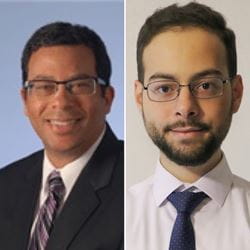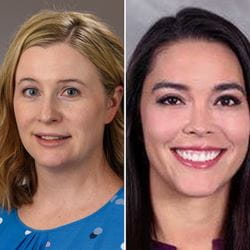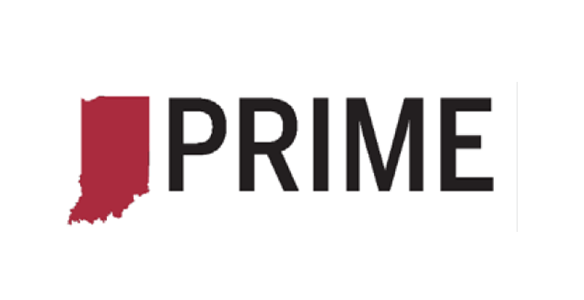The Primary Care Reaffirmation for Indiana Medical Education (PRIME) program is a grant funded through the Health Resources and Services Administration. It is housed in the IU School of Medicine Office of Medical Student Education. The goal of the PRIME program is to help medical school graduates gain understanding, direct immersion and expertise in the impact of health care disparities related to systemic racism, and the important role that primary care plays in health care delivery. (Learn more about PRIME grants.)
This year, the Department of Medicine was well-represented among grant awardees:
 Nasser Hanna, MD, and Ali Ajrouch, MD
Nasser Hanna, MD, and Ali Ajrouch, MD
Project: "Widening the Bottle Neck: Exploring the Breast Screening Program as an Effective Bridge to Lung Cancer Screening and Smoking Cessation"
Description: About 1 in 2 smokers will die from tobacco-related disease, whereby lung cancer is the most threatening tobacco related health problem. More women die from lung cancer than breast, cervical and ovarian cancers combined. Smoking cessation and lung cancer screening are well established as effective tools in reducing mortality and have a synergistic effect when used together. Yet less than half of adult smokers received advice from a provider to quit smoking in the previous year and only 8% of patients eligible for lung cancer screening in Indiana have received it in 2019. We intend to use the breast cancer screening clinic as a bridge for smoking cessation and lung cancer screening along with developing a lecture series to educate medical students and residents on health system science particularly in regards to health disparity and barriers to care.
 Khadijah Breathett, MD, MS, FACC, FAHA, FHFSA
Khadijah Breathett, MD, MS, FACC, FAHA, FHFSA
Project: "Cardiovascular Equity to Address Segregation study (CEASe) 1.0"
Description: Structural racism impacts the care of Black patients with cardiovascular disease and contributes to poor outcomes. This study seeks to address a hidden form of structural racism, cardiovascular care segregation, by examining three key questions: when does segregation of cardiovascular care occur among Black and White patients, how and why do our hospitals provide segregated cardiovascular care, and how feasibly can segregation be modified? The end product will be a toolkit of readily implementable strategies to achieve cardiovascular equity. This work will be enhanced with a Patient and Stakeholder Advisory Board that will examine findings and contribute to a line of interview and survey inquiry as well as the final product—toolkit to achieve cardiovascular equity.
 Christen Dilly, MD, ME, and Ashley Gilmore, MD
Christen Dilly, MD, ME, and Ashley Gilmore, MD
Project: "Reducing Bias and Disparities in the Care of Patients with Obesity"
Description: The overall goal of this proposal is to assess the current state of obesity bias at IUSM training programs, provide evidence-based training on recognizing such bias to target programs, and help trainees develop strategies to minimize obesity bias and subsequently reduce health disparities for patients with obesity.
 Francesca Duncan, MD, MS, and Edwin Jackson, DO, MBA
Francesca Duncan, MD, MS, and Edwin Jackson, DO, MBA
Project: "Addressing Disparities in Lung Cancer: An educational curriculum for trainees, PCPs, and community stakeholders"
Description: Racial disparities in lung cancer screening outcomes still exist, and while lung cancer screening has proven to reduce mortality by 20%, lack of adequate shared decision making discussions among providers and patients may be contributing to this disparity. We will analyze racial differences in LCS by eligible individuals and seek to improve LCS by directly engaging screening eligible individuals in PCP clinics and through community engagement. We will also create a LCS curriculum for students and providers to provide information about LCS, shared decision making among screening eligible individuals, and management of positive findings.
